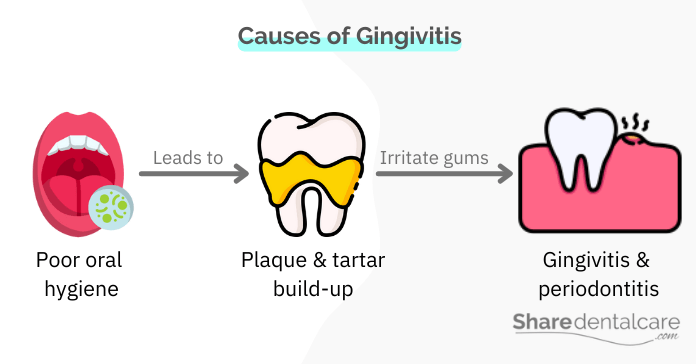Gingivitis refers to an inflammation of gum tissues which may lead to gum bleeding and swelling. The gingivitis infection is usually caused by bacteria (what is known as gram-negative anaerobic bacteria) that collect on the teeth and between them due to poor oral hygiene. It can also be caused by poor diet, smoking habits, and the use of some medications. In this article, we will discuss what gingivitis is caused by, risk factors, & symptoms.
What Is Gingivitis Caused By?
Gingivitis is usually caused by the accumulation of what is known as dental plaque around your teeth and gums. Dental plaque is a sticky film of bacteria and food debris that accumulates on your teeth every time you consume any food or drink. With poor oral hygiene, the plaque forms a thick coat over the surface of your teeth and between them. If not removed regularly, it can lead to gingivitis. If left untreated, gingivitis may further develop into periodontitis, which can cause severe damage to your gums and teeth.
As discussed above, gingivitis is caused by bacteria (what is known as gram-negative anaerobic bacteria). However, it’s not a type of bacterial infection that can be treated with antibiotics. So, you need to visit your dentist for treatment. Find out “Is gingivitis contagious through kissing?”.

Risk Factors for Gingivitis
Many risk factors can cause gingivitis, some of which are listed below:
- Poor oral hygiene: the accumulation of dental plaque is a major cause of gingivitis. So, maintaining good oral hygiene can prevent its occurrence.
- Poor diet: some types of food (such as sugary snacks and drinks) can lead to the formation of plaque on your teeth. Also, a diet lacking nutrients such as calcium and vitamin D can lead to gum tissue damage.
- Smoking & tobacco use: tobacco products (such as cigarettes & chew) can reduce the ability of your immune system to fight bacteria that causes gingivitis. Read more about does smoking cause tooth decay and gum disease.
- Dry mouth: gingivitis can be caused by a dry mouth condition (what is known as xerostomia).
- Medications: gingivitis may occur as a side effect of some medications such as steroids and some chemotherapy drugs.
What are the Signs & Symptoms Caused By Gingivitis?
The beginning stages of Gingivitis usually cause no pain. However, you may experience some discomfort such as bleeding gums, bad breath (halitosis), soreness or tenderness around your teeth, and swelling surrounding them. Signs and symptoms of gingivitis are usually observed on the first visit to your dentist. If left unchecked, it can lead to serious gum problems including periodontitis, which can affect the supporting tissues of your teeth leading to tooth loss. Read more about the differences between gingivitis vs periodontitis.
Treatment Options for Gingivitis
If detected in its early stages, gingivitis can be treated by removing plaque and tartar deposits from your teeth. So, you need to visit your dentist for professional teeth cleaning at least once every six months. In some cases, your dentist may prescribe antibiotics and anti-inflammatory drugs to control the infection and reduce the inflammation. You may also be advised to change your diet and quit smoking. Read more about home remedies for gingivitis treatment.
What Is Gingivitis Caused By – Conclusion
Gingivitis is usually caused by the accumulation of what is known as dental plaque around your teeth and gums. Poor oral hygiene allows plaque to form and bacteria to grow on your teeth. Poor diet, smoking habits, and the use of some medications can also be major triggers for it. It usually occurs in its early stages with no symptoms. However, you may experience swelling, bleeding gums, and bad breath as initial signs. If gingivitis is left untreated, It can lead to serious gum problems including periodontitis, which can affect the supporting tissues of your teeth leading to tooth loss. So, you need to visit your dentist for treatment to prevent further complications.